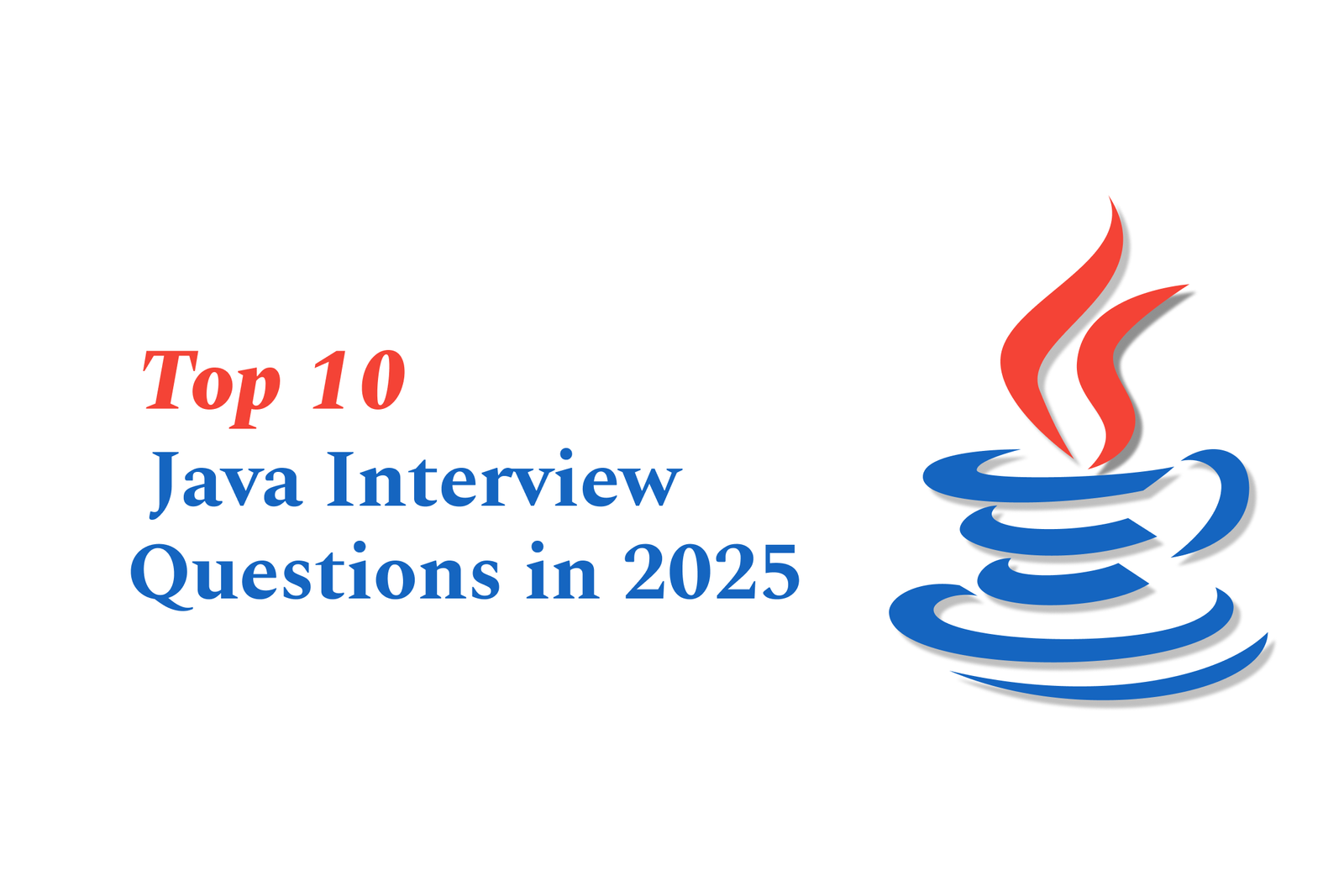Top 10 java interview questions in 2025
Top 10 Java Interview Questions in 2025 cover core concepts like OOP, exception handling, concurrency, Java 8+ features, collections, and database integration, helping candidates prepare effectively for advanced developer roles in evolving Java technology landscapes.
Top 10 Java Interview Questions in 2025
1 ) Importance of Java Interview Preparation
Java interviews require a thorough understanding of core concepts such as Core Java, Object Oriented Programming (OOP), exception handling, core APIs, and concurrency. Preparing these topics is crucial for both beginners and experienced developers aiming to excel in technical interviews.
2 ) Core Java Basics and Syntax
Candidates should be comfortable with Java fundamentals including syntax, data types, control structures, and basic programming constructs. Mastery of core Java lays the foundation for more advanced topics.
3 ) Object Oriented Programming (OOP) Concepts
Understanding OOP principles—encapsulation, inheritance, polymorphism, and abstraction—is essential. Developers must demonstrate how they apply these concepts in Java to build scalable and maintainable applications.
4 ) Exception Handling and Assertions
Interviewees need to explain Java’s mechanisms for managing errors through try catch blocks, custom exceptions, and the use of assertions for verifying program correctness during development.
5 ) Working with Core APIs
Proficiency in core Java APIs such as Collections Framework, Stream API (Java 8 features), and utility classes is expected. Knowledge of these enables efficient data manipulation and processing.
6 ) Concurrency and Multithreading
Candidates should have a solid grasp of Java concurrency mechanisms including threads, synchronization, and concurrent collections. This knowledge is critical for building robust multi threaded applications.
7 ) Practical Application in IDE and Debugging
Effective use of Java development environments, debugging tools, and best practices for writing clean, optimized code are often explored in interviews.
8 ) Advanced Java Features
Familiarity with Java 8 and later features, notably lambda expressions, functional interfaces, and streams, gives candidates a competitive edge.
9 ) Use of Java with Databases
Integrating Java applications with databases, utilizing JDBC and ORM tools like Hibernate, is a key skill for backend development interviews.
10 ) Mock Tests and Interview Practice
Engaging with real interview questions via mock tests and peer interviews helps candidates assess readiness and build confidence.
This summarized guide reflects the crucial areas to focus on for the top Java interview questions expected in 2025, ensuring comprehensive and up to date preparation.
https://justacademy.in/news-detail/flutter-vs-ionic-2025-performance
https://justacademy.in/news-detail/android-smart-home-integration-updates
https://justacademy.in/news-detail/java-developer-roadmap-2025:-what-to-learn-first
https://justacademy.in/news-detail/flutter-and-blockchain-integration
https://justacademy.in/news-detail/latest-android-camera-app-innovations
Related Posts
Java supports GDPR and data privacy by enabling secure data handling through encryption, controlled access, and precise data management. It allows developers to minimize PII exposure, ensure data confidentiality, and design workflows that comply with data protection regulations effectively.
Java code quality tools have evolved to include advanced static analysis, integrated security checks, and AI-powered code reviews. These updates help developers detect bugs, enforce coding standards, and enhance security, streamlining the development process and improving overall code reliability.
Java remains a cornerstone in big tech companies, evolving with modern features like records, pattern matching, and virtual threads. Its robust ecosystem, enhanced performance, and growing AI integrations keep it vital for both legacy systems and innovative new projects.
Java and CI/CD pipeline optimizations streamline Java application development by automating builds, tests, and deployments. They improve efficiency through parallelization, caching, and secure secrets management, enabling faster feedback loops and more reliable, scalable software delivery.
Java supports modern cryptography standards through its flexible Java Cryptography Architecture (JCA), enabling integration of advanced algorithms like AES, EdDSA, and post-quantum tools. Libraries like Bouncy Castle offer FIPS-certified, hardware-accelerated implementations for secure development.
Java 23 enhances record patterns by enabling concise, direct destructuring of record components within pattern matching, simplifying type checks and data extraction. This improvement boosts code readability and expressiveness by reducing boilerplate in handling immutable data classes.
Java remains a top choice for mobile app backends, powering scalable, secure, and high-performance server-side solutions. Latest trends include cloud-native microservices, reactive programming, and enhanced JVM optimizations, enabling efficient, flexible, and robust mobile backend development.
Java SE 24 and LTS Java SE 21 offer enhanced features and performance, while Apache Spark 4.0.0 introduces Scala 2.13 support and advanced ML and SQL capabilities. Together, they empower developers to build scalable, high-performance data applications with modern tools.
JUnit 5 modernizes Java testing with a modular architecture, improved assertions, and seamless Java 8+ support. Beyond JUnit, tools like Mockito and AssertJ enhance mocking and assertions, creating a powerful, flexible ecosystem for writing clean, efficient Java unit tests.
Java plays a pivotal role in cloud automation tools by providing a robust, platform-independent language used to build scalable automation frameworks like Jenkins and Selenium, enabling efficient CI/CD pipelines, testing, and orchestration across diverse cloud environments.










